

New York Times World sur Twitter : "Possible defection of Ling Wancheng could be intelligence coup for the US at China's expense. Central China official suspended over son's falsified employment - CHINA. A government official in Central China's Henan Province has been suspended from his position following the discovery of his son's falsified employment, local authorities said Wednesday.
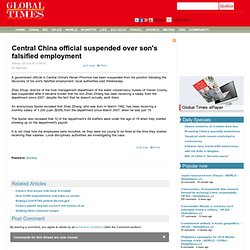
Zhao Shuqi, director of the river management department of the water conservancy bureau of Yexian County, was suspended after it became known that his son Zhao Zihang has been receiving a salary from the department since 2007, despite the fact that he doesn't actually work there. An anonymous tipster revealed that Zhao Zihang, who was born in March 1992, has been receiving a monthly salary of 1,200 yuan ($208) from the department since March 2007, when he was just 15. The tipster also revealed that 10 of the department's 69 staffers were under the age of 18 when they started showing up on the department's payroll. It is not clear how the employees were recruited, as they were too young to be hired at the time they started receiving their salaries.
Local disciplinary authorities are investigating the case. 裸体官员 - "fonctionnaire nu" Le terme « fonctionnaire nu » ou, luoti guanyuan, est un terme courant se référant à des représentants du gouvernement ou du Parti Communiste chinois dont les membres de la famille proche vivent à l’étranger ou sont déjà devenus des ressortissants étrangers.
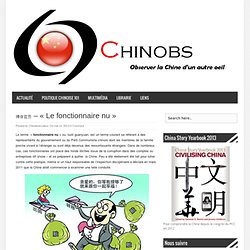
Dans de nombreux cas, ces fonctionnaires ont placé des fonds illicites issus de la corruption dans des comptes ou entreprises off shore – et se préparent à quitter la Chine. New China leader to usher in 'renaissance' - Asia-Pacific. Xi Jinping, China's new president, has said that he will try to usher in a "great renaissance", in his first speech as head of state of the world's most populous country.
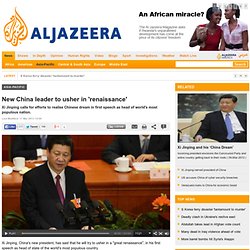
Xi called for "arduous efforts for the continued realisation of the Chinese dream", in a speech on Sunday to delegates at the National People's Congress (NPC) parliament meeting in Beijing. Calls for such a revival in the world's second-largest economy have been a motif of Xi's speeches since he took the top post in China's ruling Communist Party in November. He has close ties to China's expanding military - the navy took delivery of its first aircraft carrier last year - and called for the armed forces to strengthen their ability to "win battles".
Beijing is embroiled in a territorial row with Japan over islands in the East China Sea, and with neighbouring nations over claims to the South China Sea. Infographie : l'élection au parti commununiste chinois - Chine / 18e Congrès du PCC. A partir du 8 novembre 2012, le Parti communiste chinois se dotera d'une nouvelle équipe dirigeante.
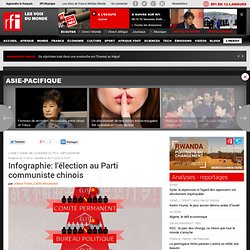
The Sinocism China Newsletter For 09.15.12. Thanks for reading.
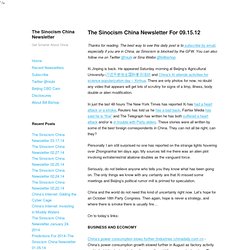
The best way to see this daily post is to subscribe by email, especially if you are in China, as Sinocism is blocked by the GFW. You can also follow me on Twitter @niubi or Sina Weibo @billbishop. Xi Jinping is back. Hu Jintao. Viewing cable 08BEIJING645, HU JINTAO's CHINA OVER THE NEXT FIVE YEARS Understanding cables Every cable message consists of three parts: The top box shows each cables unique reference number, when and by whom it originally was sent, and what its initial classification was.The middle box contains the header information that is associated with the cable.
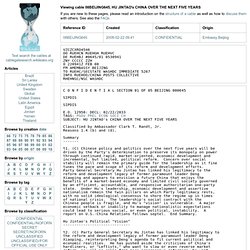
It includes information about the receiver(s) as well as a general subject.The bottom box presents the body of the cable. The opening can contain a more specific subject, references to other cables (browse by origin to find them) or additional comment. This is followed by the main contents of the cable: a summary, a collection of specific topics and a comment section. To understand the justification used for the classification of each cable, please use this WikiSource article as reference. Discussing cables If you find meaningful or important information in a cable, please link directly to its unique reference number.
Hu Jintao portrait. Viewing cable 01BEIJING12362, HU JINTAO: TAKING SHAPE AS CHINA'S LEADER Understanding cables Every cable message consists of three parts: The top box shows each cables unique reference number, when and by whom it originally was sent, and what its initial classification was.The middle box contains the header information that is associated with the cable.
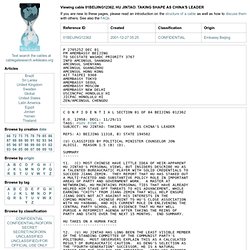
It includes information about the receiver(s) as well as a general subject.The bottom box presents the body of the cable. The opening can contain a more specific subject, references to other cables (browse by origin to find them) or additional comment. This is followed by the main contents of the cable: a summary, a collection of specific topics and a comment section. To understand the justification used for the classification of each cable, please use this WikiSource article as reference. Discussing cables If you find meaningful or important information in a cable, please link directly to its unique reference number. Victor Shih (vshih2) sur Twitter. Elite Chinese Politics and Political Economy.
China Censors Totally Awesome Communist Officials Orgy Picture Scandal. Pékin bloque les recherches internet sur Xi Jinping. La Chine, ou les défis de l'Etat-parti, par Jean-Luc Domenach - Il existe d'excellents ouvrages qui expliquent pourquoi la catastrophe déclenchée en Chine par les guerres de l'opium a engendré un processus tragique dont le Parti communiste chinois est sorti vainqueur en 1949.
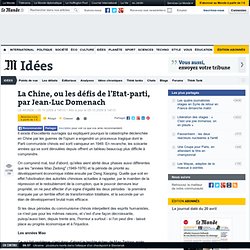
En revanche, les soixante années qui se sont déroulées depuis offrent un tableau beaucoup plus difficile à comprendre. On comprend mal, tout d'abord, qu'elles aient abrité deux phases aussi différentes que les "années Mao Zedong" (1949-1976) et la période de priorité au développement économique initiée ensuite par Deng Xiaoping. Quelle que soit en effet l'obstination des autorités chinoises actuelles à rappeler, par le maintien de la répression et le redoublement de la corruption, que le pouvoir demeure leur propriété, on ne peut affecter d'un signe d'égalité les deux périodes : la première marquée par un terrible effort de transformation totalitaire, et la seconde par un élan de développement brutal mais efficace.
L'affaire qui dévoile les luttes de clans en Chine.
Is China Ripe for a Revolution?